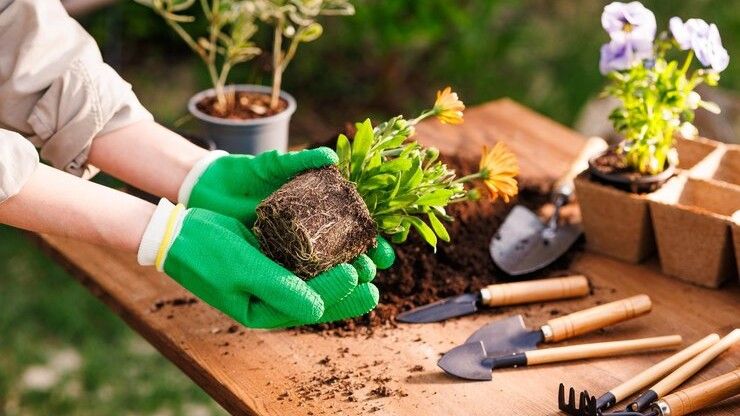
Gardening, often perceived as a simple hobby or a means to beautify one’s surroundings, is much more than that. It is a deeply enriching activity that teaches us essential values, instilling lessons that transcend the garden and apply to life itself. Whether you're tending to a small balcony garden, cultivating a community plot, or managing a sprawling backyard oasis, gardening provides an opportunity to connect with nature and grow not just plants but also virtues and wisdom.
Patience

Gardening is a masterclass in patience. Seeds sown today do not bloom tomorrow; plants follow their own natural rhythm, growing slowly but steadily. This teaches us to trust the process and wait for results without rushing. In an era of instant gratification, gardening reminds us that good things take time and that consistent effort yields the best outcomes.
Responsibility

Tending to a garden demands responsibility. Plants rely on the gardener for water, sunlight, nutrients, and care. Forgetting to water a plant or ignoring signs of pests can lead to wilting or death. This responsibility cultivates a sense of accountability, teaching us to be dependable stewards of life—be it plants, pets, or even relationships.
Resilience

Gardening isn’t without its challenges. Crops fail, pests invade, and unexpected weather can ruin months of hard work. Yet, gardeners learn to adapt, replant, and try again. This resilience is a critical life skill, teaching us to embrace failures as opportunities for growth and to persevere even when circumstances are beyond our control.
Discipline

A garden requires consistent attention. Watering, weeding, pruning, and fertilizing need to be done regularly. This instills discipline in the gardener, fostering a routine that promotes not only the health of plants but also a sense of order and commitment in daily life.
Empathy

Gardening deepens our connection with nature. Observing how plants thrive under care and struggle when neglected fosters empathy. This sensitivity to the needs of plants translates to greater compassion for other living beings, reminding us that all life is interconnected and deserving of respect.
Creativity

A garden is a reflection of the gardener’s creativity. Deciding which plants to grow, arranging them aesthetically, and experimenting with colors, textures, and layouts awaken the artistic spirit. Gardening encourages thinking outside the box, inspiring innovation and imagination in solving problems or beautifying spaces.
Mindfulness

Gardening is an inherently meditative activity. The act of digging, planting, and watering immerses one in the moment, fostering mindfulness. It slows down the frantic pace of life, allowing us to savor the present and find peace in small, repetitive tasks.
Sustainability

Gardening teaches the value of sustainability. Composting kitchen waste, conserving water, and using natural fertilizers encourage eco-friendly habits. By understanding the importance of maintaining a balanced ecosystem in the garden, we become more aware of our impact on the planet and motivated to live more sustainably.
Gratitude

The joy of harvesting homegrown vegetables or witnessing a flower bloom fosters gratitude. Gardening highlights the abundance of nature and the effort it takes to cultivate even the smallest rewards. This appreciation extends beyond the garden, helping us recognize and cherish life’s blessings.
Teamwork

Gardening often involves collaboration. Whether it’s sharing tools with neighbors, exchanging seeds, or working in a community garden, it teaches the value of teamwork. Collaborative gardening fosters a sense of belonging, strengthening bonds and building supportive relationships.
Adaptability
Gardening is subject to the whims of nature—unpredictable weather, seasonal changes, or even pest outbreaks. These challenges teach adaptability and the importance of adjusting plans when circumstances change. This flexibility is a vital skill that equips us to handle life’s uncertainties with grace.
Humility
Despite a gardener’s best efforts, nature remains in control. A sudden frost, a drought, or an unexpected pest infestation can remind us of our limitations. Gardening teaches humility, encouraging us to respect the power and unpredictability of the natural world.
Joy in simplicity
Gardening proves that joy can be found in simple things—a sprouting seed, a budding flower, or a butterfly visiting the garden. It encourages us to slow down and appreciate life’s small, beautiful moments, reminding us that happiness doesn’t always require grandeur.
Health and wellness
While not a value in the traditional sense, gardening promotes physical and mental well-being. The physical labor involved strengthens the body, while the calming nature of the activity reduces stress and anxiety. This focus on self-care enhances our ability to approach life with positivity and vigor.
Lessons from the soil
Gardening is far more than an act of cultivating plants—it is a journey of personal growth. The values learned through gardening—patience, responsibility, resilience, empathy, and more—shape us into better individuals, capable of navigating life with wisdom and grace.
In tending to a garden, we nurture not only the earth but also our own spirit, discovering that the greatest growth often happens within. So, the next time you pick up a trowel or plant a seed, remember: you’re not just growing a garden; you’re cultivating values that will flourish for a lifetime.
(Sujal Chawathe is a CA by education but a gardener at heart. Her venture Indoor Greens helps urban offices and homes, add and maintain plants)